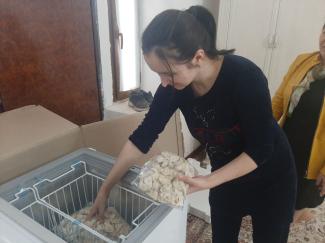Enabling Returned Migrants to Stand on Their Own Feet
Shakhnoza Abdurakhmanova, 24, is now known in her local community as a successful small-scale entrepreneur. However, a few years ago, she could barely find enough money to cover her family’s basic needs. “There were times when we couldn’t pay the utility bills and would end up without electricity or gas at home, and move to our parents’ house just to survive,” Shakhnoza shares.
Shakhnoza and her husband had been labor migrants in Russia, hoping to earn a decent living to have a better life when they would return home. But they returned with almost no savings. While working abroad, they discovered their earnings barely covered the expenses in Russia. Their life at home was also a challenge because her husband’s income would only cover their basic needs and Shakhnoza worried about providing for her four-year-old son’s future. The family was constantly living on the edge of poverty.
“When I worked in Russia, I learned how to make dumplings. After I returned home to Uzbekistan, I started to make dumplings and freeze them. I then sold them to friends and neighbors,” said Shakhnoza.
Soon, the news about her tasty dumplings spread in her community. She started getting orders, including for weddings and parties. There was just one problem: she didn’t have a freezer to store a larger amount of her product.
Shakhnoza started looking for funds to buy a big freezer, but she couldn’t get a loan, since she wasn’t officially employed. She wanted to capitalize on the orders for her pre-made dumplings for big parties but didn’t know how to solve the problem of buying a freezer.
A local government committee in her community advised her to apply for a program at the Women’s support center Istiqbol, a local non-governmental organization (NGO) in the Khorezm region, that helps returned migrants to start their own businesses. The NGO is a partner of USAID’s Safe Migration in Central Asia activity, implemented by Winrock International, that strengthens bilateral and multi-country actions to promote rights-based migration and counter trafficking in persons.
Istiqbol reviews each request of returned migrants and victims of human trafficking and tries to help them by providing social and psychological assistance, business training, and purchasing tools to start or expand their businesses. Shakhnoza already had a business going, she only needed the freezer to increase the turnover and ensure sustainability.
“After careful review of her case, we decided to help her,” said Iroda Ozodova, who heads Istiqbol. The program started two months ago in Uzbekistan and already 196 returned migrants, at-risk groups, and families of migrants have received psychosocial, legal, and economic support that has improved their lives.
“Now, with enough space to store more pre-made products, I started making a variety of foods, like lagman (noodles), piroshki (stuffed buns), vareniki (dumplings with mashed potatoes), and tuhum-barak (a local delicacy in Khorezm). With the money earned, I managed to buy an electric water pump, so now my family has better access to water,” said Shakhnoza with a smile.
“I had thought that migrating to Russia for work was the only way to improve our family’s living conditions. Now I know that I don’t need to go abroad to fulfill my dreams,” added Shakhnoza. As of December 2021, Shakhnoza is one of 196 returned migrants in Uzbekistan who received assistance from USAID to improve their livelihoods in their hometowns.

